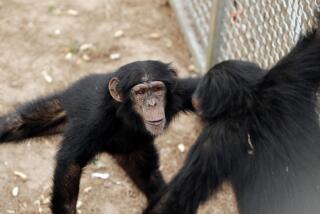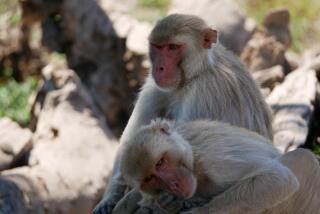Traditions aren’t lost on the mongoose
- Share via
Big-brained mammals such as humans and chimpanzees aren’t the only creatures that pass on traditions to their young. Even the tiny banded mongoose can pass down learned habits to younger generations, a new study has found.
The report, published online Thursday in the journal Current Biology, is the first to show experimentally in the wild that individual animals can pass on strongly held customs and that multiple traditions can coexist in a single population, said lead author Corsin Muller, now an animal cognitive scientist at the University of Vienna.
The experiment, Muller said, “is the first one that shows in a natural population that there really are these traditions as we would see in humans — [although] obviously not as many and as complex.”
The study by Muller and his colleagues focused on the feeding habits of mongooses. The little carnivores eat all sorts of prey, including hard-shelled rhinoceros beetles and bird eggs. To break the shells, the animals either whack them against a hard surface or crack them with their teeth.
The scientists designed a special food item for the mongooses — a plastic egg filled with a mix of rice and fish. They placed it near free-living young adult mongooses and observed that the animals had strong preferences for cracking or biting to access their food.
The scientists next took advantage of a characteristic of mongoose society: the fact that juvenile mongooses will pick out a young adult to follow around until they are old enough to fend for themselves. Since this is an exclusive pairing, the scientists could then see whether the mongoose pups picked up the older mongoose’s eating habits.
The scientists placed an egg near each pair and waited for the adult mongoose to open it, in its preferred way, right in front of its young sidekick. They did this 10 times for each mongoose pair.
A few months later, when the 42 surviving pup mongooses were old enough to do their own foraging, the scientists tested which method the youngsters themselves preferred.
They found that the younger mongooses overwhelmingly preferred the technique used by their elder companion.
Bennett Galef, an animal behaviorist at McMaster University in Canada who wrote a commentary on the study, said that examining basic traditions like these in animals might help scientists track down the evolutionary origins of customs in human culture.
However, he added, the link between what human beings do and what animals like mongooses do “is something people are going to argue about for a while.”







